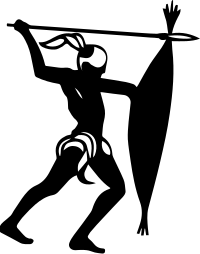UMkhonto we Sizwe facts for kids
Quick facts for kids uMkhonto we Sizwe |
|
|---|---|
 |
|
| Leaders |
|
| Dates of operation | 1961–1993 |
| Allegiance | |
| Ideology |
|
| Political position | Far-left |
| Allies | |
| Opponents | |
| Designated as a terrorist group by | |
uMkhonto we Sizwe (pronounced "oom-KON-toh we SEE-zweh"), which means "Spear of the Nation," was often called MK. It was the armed group of the African National Congress (ANC). Nelson Mandela started MK after the Sharpeville massacre.
MK's main goal was to fight against the Apartheid government in South Africa. This government had unfair laws that separated people by race. MK wanted to end these laws and bring fairness to everyone.
Contents
What Was uMkhonto we Sizwe?
In June 1961, MK warned the South African government. They said they would fight if the government did not change its unfair laws. On December 16, 1961, MK launched its first attacks. These attacks targeted government buildings and symbols of apartheid.
Because of these actions, the South African government called MK a "terrorist organization." They also made it illegal. This meant MK had to operate in secret.
Early Days and Challenges
For a while, MK's main office was in Rivonia. This was a quiet area near Johannesburg. On July 11, 1963, police arrested 19 ANC and MK leaders there. This happened at Liliesleaf Farm.
The farm was bought using money from the South African Communist Party and ANC. This was because non-white people could not own property in that area. This was due to the unfair Group Areas Act.
After the arrests, the famous Rivonia Trial began. Ten ANC leaders were put on trial. They were accused of 221 acts of resistance against the government. Wilton Mkwayi, a leader of MK, managed to escape during the trial.
How MK Was Organized
MK was formed quickly in 1961. Its leaders set up teams in major cities. People were chosen for these teams based on their skills. Some had military training, while others were part of the ANC's allies.
Important Leaders
The main leaders of MK's central command included:
- Nelson Mandela
- Walter Sisulu
- Joe Slovo
- Raymond Mhlaba (joined in 1962)
- Wilton Mkwayi (joined in 1963)
Regional Teams
MK also had teams in different parts of South Africa. These included:
- Johannesburg (later called Transvaal)
- Natal
- Western Cape
- Eastern Cape
- Border
There was also a special team for explosives.
The End of MK's Fight
MK stopped its armed actions during talks to end apartheid. This happened before the official end of apartheid. On December 16, 1993, MK was formally disbanded. This was done in a ceremony at Orlando Stadium in Soweto.
Who Were Some Key Members?
Many brave people were part of uMkhonto we Sizwe. Besides co-founder Nelson Mandela, some other important members included:
- Tatamkhulu Afrika
- Sipho Binda
- Anton Fransch
- Joe Gqabi
- Denis Goldberg
- Harry Gwala
- Chris Hani
- Samuel Hlongwane
- Ronnie Kasrils
- Moses Kotane
- Tryphina Mboxela Jokweni
- Lennox Lagu
- Moses Mabhida
- Ashley Kriel
- Robert McBride
- Mac Maharaj
- Dikgope Madi
- Solomon Mahlangu
- Isaac Lesiba Maphotho
- Rudzani Maphwanya
- Jerry Masisi
- Vusumuzi Masondo
- Davidson Masuku
- Lawrence Mbatha
- Govan Mbeki
- Thabo Mbeki
- Duma Mdutyana
- Raymond Mhlaba
- Wilton Mkwayi
- Joe Modise
- Thandi Modise
- Thabiso Mokhosi
- Lambert Moloi
- Alex Moumbaris
- Fabian Msimang
- Mavuso Msimang
- Refiloe Johannes Mudimu
- Phila Portia Ndwandwe
- Godfrey Ngwenya
- Wilson Nqose
- Siphiwe Nyanda
- Vejaynand Ramlakan
- Tom Sebina
- Aubrey Sedibe
- Solly Shoke
- Walter Sisulu
- Joe Slovo
- Marion Sparg
- Oliver Tambo
- Lindile Yam
- Tony Yengeni
- Andrew Zondo
- Jacob Zuma
Looking Back: The Impact of MK
The time when MK was active was a period of conflict. From 1976 to 1986, about 130 people were killed in actions involving MK. This included members of the security forces and civilians.
In return, many MK members were also killed. This happened in raids by the South African Defence Force. The fight for freedom in South Africa was long and difficult for everyone involved.
See also
 In Spanish: Umkhonto we Sizwe para niños
In Spanish: Umkhonto we Sizwe para niños
- Day of Reconciliation
- Internal resistance to apartheid
- South African Border War
- Military history of South Africa
 | DeHart Hubbard |
 | Wilma Rudolph |
 | Jesse Owens |
 | Jackie Joyner-Kersee |
 | Major Taylor |

